Recent fighting in Sudan has exacerbated a situation that had already become extraordinary in 2022 with the Russian invasion of Ukraine or the humanitarian crisis in Afghanistan.
110 million people around the world have had to flee their homes, the United Nations announced on Wednesday, June 14, seeing the record number as an “indictment” on the state of the world.
Recent fighting in Sudan has exacerbated a situation that had already become extraordinary in 2022 with the Russian invasion of Ukraine or the humanitarian crisis in Afghanistan. The United Nations High Commissioner for Refugees emphasized in its annual report that the total number of refugees or internally displaced persons who have fled their country has never reached such a high level.
According to UNHCR, 108.4 million people were displaced or refugees at the end of last year. That’s 19.1 million more people than at the end of 2021, an unprecedented increase. And fighting between rival factions in Sudan pushed the total number of refugees and displaced people to around 110 million in May. “This is where we stand today,” UNHCR chief Filippo Grandi said at a press conference in Geneva.
“A More Hostile Environment”
“We have 110 million people who fled because of conflict, persecution, discrimination and violence, often mixed with other motives – especially the effects of climate change,” he emphasizes, lamenting the increase since last year. “It’s an indictment of the state of our world,” said Judge Filippo Grandi. Of the total in 2022, 35.3 million people were refugees and 62.5 million were displaced. There were also 5.4 million asylum seekers and 5.2 million others in need of international protection.
All of these people “are facing a more hostile environment almost everywhere, particularly with regard to refugees,” notes the High Commissioner. “Being a real leader means convincing public opinion that there are people who deserve international protection,” he stresses. Three quarters of refugees flee to low- and middle-income countries.
“The door must remain open”
Filippo Grandi welcomed the European Union’s recent progress in reforming migration policy, calling it a good attempt to even out tensions around these issues and calling it “relatively fair”. The reform envisages a system of solidarity between member states in the care of refugees and an accelerated examination of the asylum applications of certain migrants at the borders. It still has to be approved by the European Parliament.
According to the High Commissioner, we need to start much earlier to deal with the influx of migrants who want to come to Europe on their long journey. However, in Europe, in the UK or in the US, “the door must remain open” for asylum seekers. “Asylum seekers should not be put in jail. “Ask for asylum is not a crime,” stresses Filippo Grandi, condemning London’s plan to send asylum seekers to Rwanda in particular. He is also concerned about US policy in this area.
UNHCR ‘financially not good’
Filippo Grandi admitted that the organization he heads “was not in a good financial situation this year” like many other humanitarian organizations such as the International Committee of the Red Cross (ICRC). The global economic situation and inflation are making fundraising difficult. For example, UNHCR has only 16% of the funds it estimates for Sudan, and that figure drops to 13% for aid to refugees displaced by the explosion of violence in Sudan.
Last year, more than 339,000 refugees from 38 countries returned home, while 5.7 million displaced persons were able to return to their homes. The countries hosting the most refugees are Turkey (3.6 million), Iran (3.4 million), Colombia (2.5 million), Germany (2.1 million) and Pakistan (1.7 million) .

